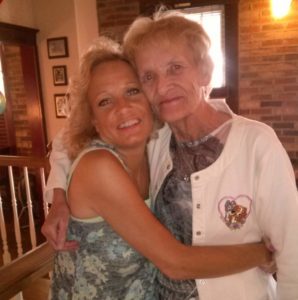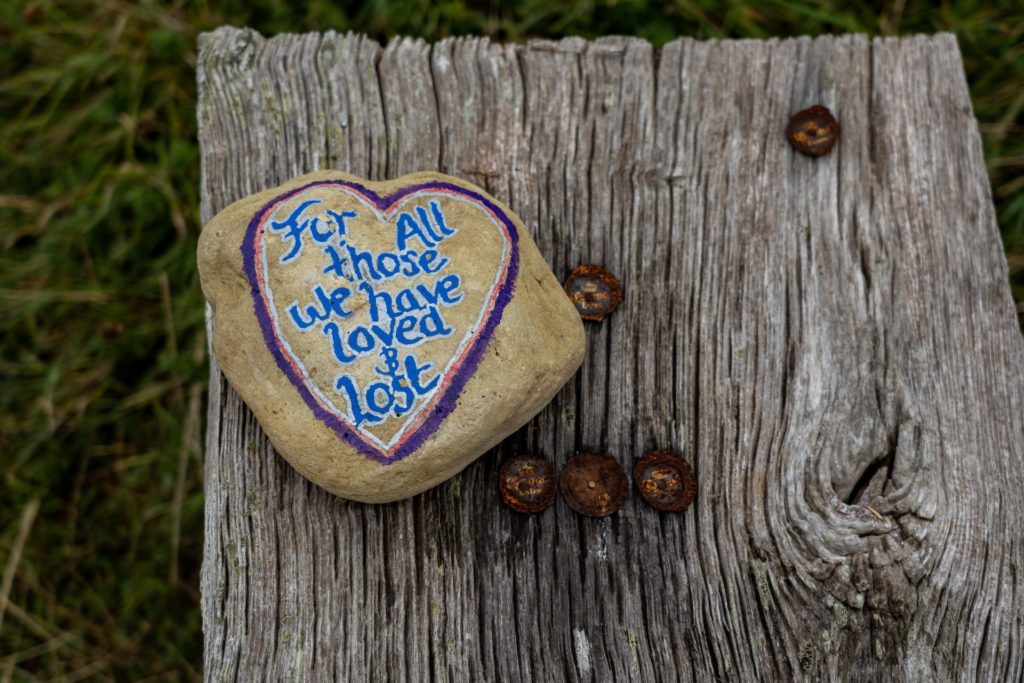There are many types of grief one can experience throughout a lifetime. Whether that’s the loss of a job or home, going through a divorce or breakup, or estrangement from family members. Though this article focuses on dealing with grief and loss due to the death of a loved one, each type of grief requires its own type of emotional support.
No matter what type of loss you’re experiencing right now, everyone’s experience with grief is different. Below I discuss my recent and ongoing journey with grief and offer some recommendations and resources to help guide you through this difficult time.
Receiving “The Call”
On the afternoon of July 26, 2019, I received a phone call that would change my life and the lives of our entire family, forever. My sister told me that our mom was on a ventilator, fighting for her life after becoming critically ill with double pneumonia. She had sepsis and her organs were shutting down. The next morning my husband and I were on a flight to Florida with my sister and her husband. Later that day our sisters and brother would arrive.
The doctors met with us and explained that mom’s condition continued to decline. Even if she survived, she had sustained permanent organ damage and would likely require extensive rehabilitation, with no guarantee that her quality of life would ever improve. After a few more days and no signs of improvement, the doctors told my father that he needed to make a decision on whether to keep her on the ventilator.
My mother had always been vehement about not being kept alive by machines. Respecting her wishes, my father and oldest sister had to make the difficult decision to take mom off of the ventilator. If she survived, she’d be moved to a hospice care facility. However, it wasn’t meant to be. Twenty-two minutes after they removed the ventilator, with the love of her life and her children at her bedside, my mother passed away.
This was a traumatic experience for me and my family members. Just a week before receiving that phone call I was laughing with my mom and enjoying a glass of wine together on a video chat. None of us had any idea that she was ill. Yet there we were saying our goodbyes and telling her it was ok to go home. How was this possible?
Our family had managed to cope with so many losses and difficulties throughout the years. But this was different. My mother truly was our matriarch – the glue that held the five of us kids and our families together. When we lost her, it had a domino effect and our family’s foundation became shaky.
Adjusting to a New Normal
For the better part of a year, I experienced intense, often overwhelming moments of grief. At first, there were days that I didn’t want to get out of bed. I tried to allow my emotions as they came and went but honestly, sometimes it was too overwhelming. And the thought that these feelings might stick around for years, or even a lifetime, felt daunting.
I’d sit down to meditate most days knowing that some tough stuff was going to rear its ugly head. Deep down I knew the strong emotions and difficult thoughts I was experiencing had to be worked through if I were to move forward in my life in the healthiest way possible. Stuffing them down or avoiding them would only lead to more suffering in the long run. I knew I needed to lean into my mindfulness training. So I did. Every day I reminded myself that the tough moments were only temporary and what I needed most was self-compassion.
Finally, after several months, I started to feel a little more like myself. I started to reframe my experience of loss. What I once viewed as the saddest, most tragic experience of my life began to change. I began to feel immense gratitude for being blessed with a loving mother who had become one of my best friends, and then gratitude for the opportunity to be with my mother in her final moments. These were precious gifts bestowed upon me. I now understood that the deep sorrow and pain I felt was because of the profound love I carried for her in my heart.
I wouldn’t say things were back to normal but rather a new normal. But life was about to deal another blow to our family.
Cumulative Grief
Fast forward a year to August 2020. My sister is now on a ventilator with double pneumonia, her liver and kidneys failing. Somehow she survived and was released from the hospital. However, she suffered from multiple health issues throughout her adult life that challenged her overall health and complicated her prognosis. She was in and out of the hospital every couple of weeks from August through December. Ultimately, my sweet sister passed away in the hospital in the early morning hours of December 14th.
Like so many who’ve experienced loss during this pandemic, we did not get that final in-person goodbye. This lack of closure has been the hardest for me to cope with this time around. I’m still struggling with the idea of my sister passing away alone. I know I’m not alone in this experience, as so many have lost loved ones to COVID or other illnesses and weren’t able to be by their sides because of pandemic restrictions.
Since the beginning of the COVID pandemic, there are many who’ve lost multiple loved ones within a short period. Experiencing multiple losses is a form of cumulative grief, where each new loss triggers grief for the previous losses. It’s heartbreaking, extremely stressful, and physically and emotionally exhausting.
Life hits us hard sometimes and honestly, the only way through those moments is to just get through them. Get through the next minute, the next hour, the next day, etc. It’ll take time for you to find your new normal but it will eventually happen.

“Normal” Grief
In my humble opinion, there really is no “normal” way to grieve. Nor is there a “normal” time frame that we should allow ourselves to grieve. Grief is a deeply personal and unique journey for all of us. For many, it’s more like a rollercoaster rather than a set of stages that we neatly navigate. And buying into the idea that there’s only one way to grieve opens the door to self-criticism for “not grieving right.” This is never helpful.
Although there’s no “right” way to grieve, grieving is an essential process. Grief evokes resilience. Healthy grieving allows us the ability to hold our loved ones in our hearts and minds while moving forward in our lives with a sense of peace and purpose. It takes time, patience, and a lot of self-compassion.
Here are several ways you can use mindfulness to help you grieve in a healthy way.
Mindful Coping Strategies for Dealing With Grief and Loss
1. Allow & accept your feelings. First and foremost, it’s ok to not be ok. Allow yourself to feel whatever emotions are there for you at any given moment, with a sense of self-compassion, acceptance, and nonjudgment. Bringing awareness to what’s going on internally can help with recognizing and labeling strong emotions for what they are- a transient feeling that will pass.
Additionally, when we take time to acknowledge the sensations in our bodies, such as pain or tightness, it can reveal how those emotions affect our physical bodies.
2. Express yourself. Expressing your feelings in a way that is healthy and helpful to you is very important. For example, talking about the experience, journaling, drawing/painting, scrapbooking, or dancing, are creative yet helpful ways to process grief.
If none of these ideas resonate with you, think about what you enjoy doing most, or try a few different things and see what feels good to you.
3. Reach out/lean on support systems. Don’t try to bear your burden alone. During this time, it’s essential to have a support system, whether that’s family or a close friend, a spiritual counselor, support groups, or a psychologist.
Sometimes it can be helpful to offer support to other people who are grieving. Find a balance between time by yourself, and being with others. It’s better to reach out instead of isolating.
4. Continue to take care of yourself. While grieving, it can be easy to stop caring for yourself. The stress and overwhelm may leave you drained with little energy for self-care. However, it’s important to continue to eat well, get enough sleep, exercise, and engage in wellness practices as much as possible during this tough time.
It can be helpful to schedule a weekly “self-care date.” This is a time to check in with yourself and do something that helps you relax. It’s even better if you can work in self-care daily.
5. Honor and celebrate your loved one’s life: Keeping the memory of your loved one alive in a way that both inspires growth and expresses and honors your unique relationship is important to the grieving process.
Here are some ideas for how to honor a loved one who has passed on:
- Hold a memorial service, a celebration of life ceremony, or candlelight vigil. You can do this in addition to or instead of a traditional funeral. Coordinating a memorial event for your loved one is a wonderful way to commemorate them on any meaningful date, such as their birthday or on the anniversary of their death.
- Donate to or volunteer with a charity that was special to your loved one.
- Adopt a park or section of highway in their name. Or sponsor a bench or a brick at one of their favorite places. Have a sign or placard made, marking that space is maintained in your loved one’s honor.
- Establish a scholarship fund in their name. This could be an academic scholarship, athletic, music, etc. Consider holding an annual fundraiser to support it if you’re not able to fund it entirely on your own.
- Plant a tree in their memory.
- Compose a song or a poem that celebrates the life of your loved one.
- Dedicate an event to their memory. Choose something that they loved doing and create an annual or one-time event to honor them.
- Make a scrapbook of their life. Gather photos and create a paper or digital tribute that celebrates your loved one’s life.
- Butterfly release. There’s beauty and symbolism in a butterfly release. Consider honoring your loved one with this eco-friendly ceremony.
- Let their life inspire you. Try out one of their favorite hobbies or visit places they held special. You’ll feel connected to their spirit in these moments while trying something new that you may not have considered otherwise.
By practicing mindfulness while grieving, you can bring awareness to your emotions and how they affect you physically. And by being mindful of your thought patterns you’ll be better able to recognize when thoughts are on a downward spiral and be better prepared to work through them on your own or by seeking professional help.
Again, it takes a boatload of self-compassion and patience to work through grief and loss. You’ll have to set boundaries, seek companionship with those who accept and love you exactly as you are, and spend less time with those who don’t.
There are grief support groups available throughout the U.S. that can walk alongside you through this most difficult time. Check out this list of Grief, Loss, and Bereavement Support Groups on Verywellhealth.com. The list of groups is arranged alphabetically by the type of loss. It isn’t a comprehensive list by any means. However, they offer assistance regardless of where you live. You can also search for grief support groups in your community.
If you’d prefer an online support group, here’s Verywellhealth.com’s list of The 7 Best Online Grief Support Groups of 2021.
I know all too well that grief is a difficult journey. But continue to share the memories, let the tears flow, be gentle with yourself, and hold your loved ones close.


